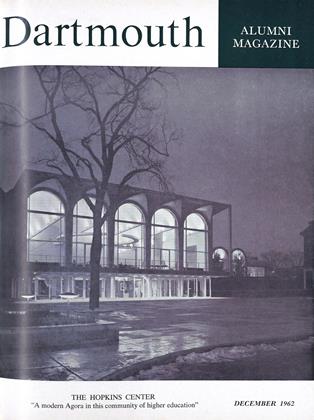Frank J. Johnson '51. Chicago: HenryRegnery Company, 1962. 230 pp. $500
The author of this volume, a former Government official, sees the United States already "at war" and "losing." We are losing, he argues, "because we have, so far, not resolved to win." The solution is to take the offensive. His idea of an offensive is chilling, to say the least. He would first inform the Soviet premier that we see through his bluff and no longer plan to abide by his "rules of the game." To give force to this pronouncement, we would sever relations with Russia, except to ensure minimum communication. Mr. Johnson's plan does not include an attack on Russia itself, but he would announce as our aim "the liberation of every nation now under Communist control and the destruction of the world-wide Communist conspiracy."
He would begin with Cuba, first a blockade (prophetic), soon followed by an invasion with Cuban exiles and American air power; after the Cubans have made a "free choice" of Castro's successor, we withdraw. Albania comes next, and should present no problem. China, Mr. Johnson concedes, will be more difficult, but the "unleashing" of Chiang Kai-shek, coupled with American naval and air power, will at least start the process of Mao's eventual collapse. "Neutralism," of course, falls by the wayside in Mr. Johnson's scheme and the criterion for allowable leaders in the new nations of Asia and Africa is that they be staunchly antiCommunist; he acknowledges that they will be mainly generals. And so on.
The sobering effects of the Cuban crisis which had not, of course, unfolded when Mr. Johnson was composing his study - are too closely with us for these recommendations to give comfort to any except possibly the demented few seeking corroboration of wild schemes for American grandeur. Surely there is room for the conservative view in international affairs, as there is for every other view. But it must be argued from plausible hypotheses and with some regard for eventualities; the argument can not be built on platitudes and cliches tailored to one's bias. The fact that Mr. Johnson is a recent Dartmouth graduate is a reminder that the College has still some distance to go to instil wisdom in its sons.
CHARLES B. McLANE '41
-
 Books
BooksROOSEVELT AND THE RUSSIANS
December 1949 By Charles B. McLane '41 -
 Article
ArticlePasternak and the Russian Community
JANUARY 1959 By CHARLES B. McLANE '41 -
 Books
BooksTHE SOVIET DESIGN FOR A WORLD STATE.
July 1960 By CHARLES B. MCLANE '41 -
 Books
BooksSOVIET CRIMINAL LAW AND PROCEDURE: THE RSFSR CODES.
MAY 1966 By CHARLES B. MCLANE '41 -
 Books
Books"A Mess of Russians"
OCTOBER, 1908 By Charles B. McLane '41 -
 Books
BooksInside the Enigma
JANUARY/FEBRUARY 1984 By Charles B. Mclane '41
Books
-
 Books
BooksAlumni Notes
October 1948 -
 Books
BooksINTRODUCTION TO THE STUDY OF PUBLIC ADMINISTRATION
June 1939 By Elmer E. Smead -
 Books
BooksTHE MEANING OF CULTURE
MARCH 1930 By H. F. West -
 Books
BooksTHE JAPANESE VILLAGE IN TRANSITION
March 1951 By TREVOR LLOYD -
 Books
BooksDizzying Truths
September 1978 By WALTER W. ARNDT -
 Books
BooksELEAZAR WHEELOCK: FOUNDER OF DARTMOUTH COLLEGE,
October 1939 By Wayne E. Stevens









